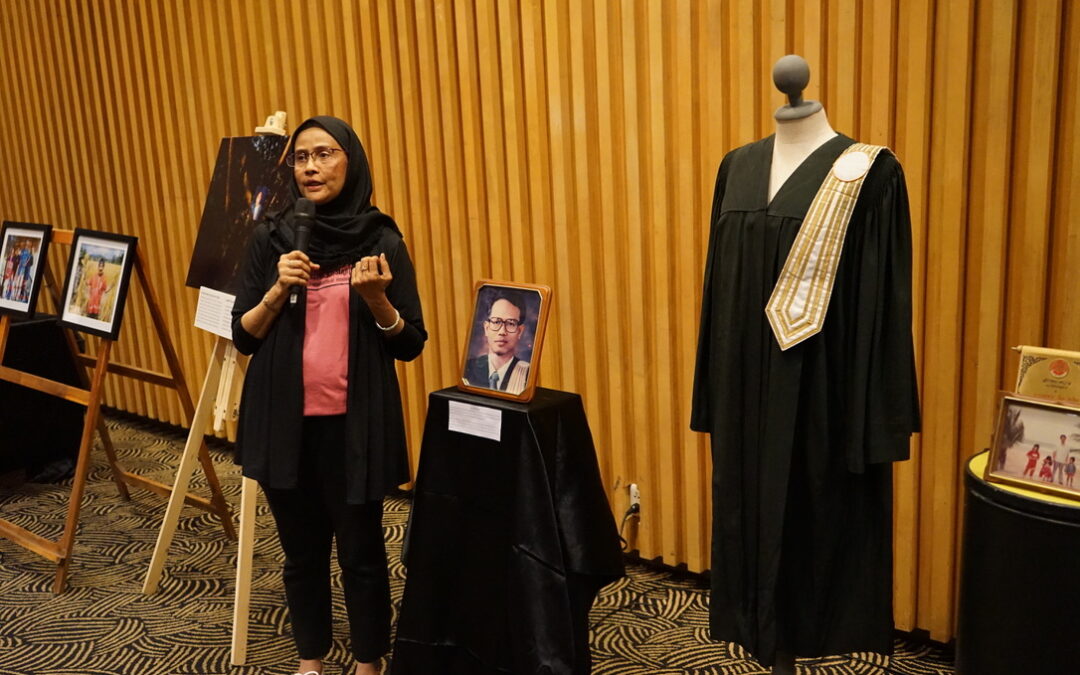
Mar 12, 2020 | News
On 11 March 2020, the ICJ co-hosted a panel discussion and an exhibition entitled “Committed to Memory: The Disappeared and Those They Left Behind.”
The event was held to mark the 16th anniversary of the enforced disappearance of a prominent lawyer and human rights defender Somchai Neelapaijit and other individuals who were subject to apparent enforced disappearance and whose fates remain unknown.
The event was held at Bangkok Art and Cultural Centre (BACC). More than 100 participants attended the event.
Opening remarks were delivered by Jenni Lundmark, Programme Officer, Delegation of the European Union to Thailand, and Associate Professor Dr. Gothom Arya, Adviser of the Institute of Human Rights and Peace Studies at Mahidol University.
Jenni Lundmark highlighted the European Union’s commitment to address torture and enforced disappearance and urged the Thai Parliament to pass pending anti-torture and enforced disappearance legislation without undue delay. Associate Professor Dr. Gothom called on the public to preserve the memory of the Thai persons who were victims enforced disappeared as well as many others whose disappearance were not recorded. He also encouraged the establishment of a network of victims of enforced disappearances to strengthen their advocates’ ability.
The event also featured photos and personal belongings of victims or potential victims of enforced disappearance, including: Somchai Neelapaijit, Thanong Po-Arn, Porlajee “Billy” Rakchongcharoen, Kamol Laosophaphan, Jahwa Jalo, Surachai Danwattananusorn, Siam Theerawut and Den Khamlae. For some of these cases, there has been a failure of authorities to conduct a prompt, effective, impartial and independent investigation into their cases. During the event, family members of the victims described stories from photos and personal belongings of the “disappeared” that were exhibited.
The panel discussion focused on progress of the investigations into enforced disappearances and evaluated the progress in developing legislation in Thailand to address this critical issue. The speakers included Angkhana Neelapaijit, wife of Somchai Neelapaijit; Thipwimon Sirinupong, lawyer who is representing Porlajee “Billy” Rakchongcharoen’s family; and Sanhawan Srisod, ICJ’s legal adviser.
During the discussion, speakers expressed concern at the recurrent delays in the amendment and enactment of the law against torture and enforced disappearance which will be critical for ensuring accountability and justice for victims of enforced disappearance. They also regretted that the latest Draft Act, after several rounds of revisions and public hearings, still had not addressed many of the principal shortcomings which the ICJ and other stakeholders and experts have indicated need necessarily be amended in order to bring the law into line with Thailand’s international human rights obligations.
The key concerns include the incomplete definitions of the crimes of enforced disappearance, the absence of provisions concerning the continuous nature of the crime of enforced disappearance and statute of limitations for torture and enforced disappearance crimes, and the inadequacy of provisions concerning safeguards against enforced disappearances.
Background
Somchai was stopped at a Bangkok roadside on 12 March 2004 and pulled from his car by a group of men. He has not been seen since.
At the time, Somchai was defending clients from Thailand’s restive southern provinces who were accused of attacking a military base as part of the ongoing insurgency in the region. Somchai had alleged police tortured the Muslim suspects.
Since 19 July 2005, DSI has spent more than 14 years and eight months investigating the enforced disappearance of Somchai Neelapaijit. However, there is little information in the public domain regarding its progress.
From 1980 to May 2019, the UN Working Group on Enforced or Involuntary Disappearances has recorded and transmitted 90 cases of alleged enforced disappearance to Thailand. Currently, 79 cases remain outstanding.
Further reading
Ten Years Without Truth: Somchai Neelapaijit and Enforced Disappearances in Thailand
Thailand: continuing delay in the enactment of the draft law on torture and enforced disappearance undermines access to justice and accountability
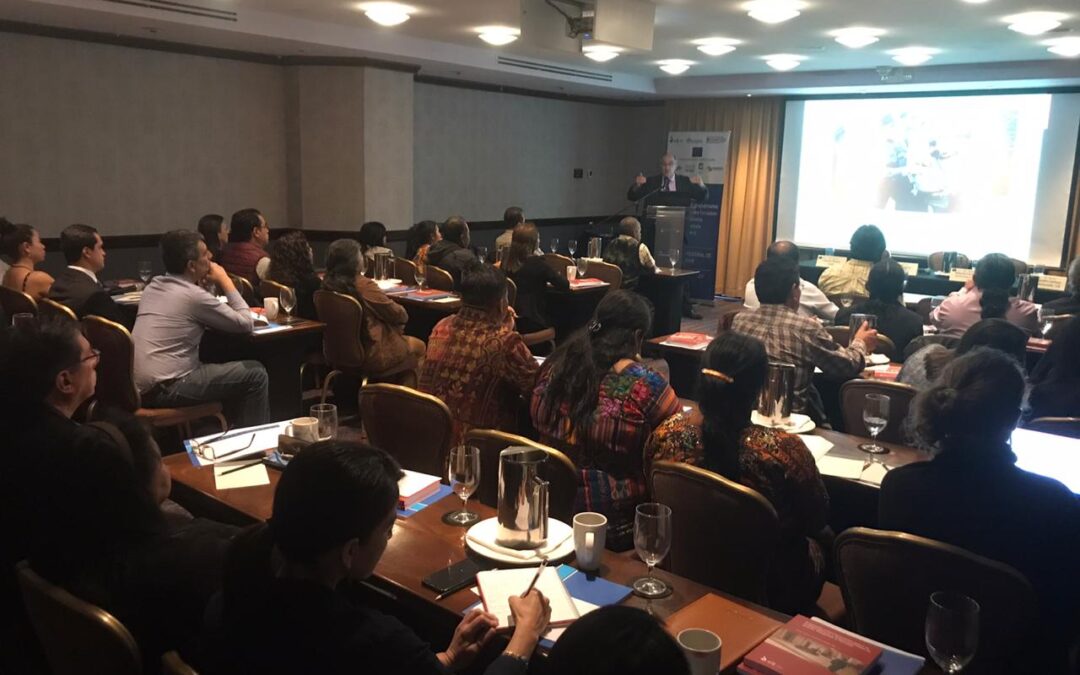
Feb 13, 2020 | News
The ICJ convened two workshops in Guatemala City from 11 to 13 February for more than 30 lawyers and more than 30 representatives of victims’ organizations on the international law and standards that apply to the investigation of unlawful death and enforced disappearances.
The workshops were conducted as part of the project under the ICJ’s Global Accountability Initiative entitled, Promoting justice for extrajudicial killings and enforced disappearances in Colombia, Guatemala and Peru, and supported by the EU European Instrument for Democracy and Human Rights (EIDHR). The project promotes accountability of perpetrators and access to effective remedies and reparation for victims and their families in cases of extrajudicial killings and enforced disappearances.
The workshop for lawyers was inaugurated by the President of the Board of Lawyers of Guatemala, Ovidio Orellana. The workshop with representatives of victims organizations was inaugurated by the Chief of Cooperation of the European Union Alberto Cortezón.
Participants in the workshops emphasized that the Guatemalan public authorities must respect and effectively impolement the the revised Minnesota Protocol on the Investigation of Potentially Unlawful Death, and that there was a need to reinforce advocacy strategies for the respect of the Protocol by the Guatemalan Human Rights Institutions.
The Presidential Commission on Human Rights (COPREDEH) and the Ombudsman´s Office participated during the workshop with victims’ organizations. They committed themselves to take the necessary actions to incorporate into their work the principles and content of the Minnesota Protocol, as a complementary tool to other conventions and binding law.
Contacts:
Ramón Cadena, Regional Director of ICJ’s Central America Office, email: ramon.cadena@icj.org
Kingsley Abbott, Senior Legal Adviser & Coordinator of the ICJ’s Global Accountability Initiative, email: kingsley.abbott@icj.org
Carolina Villadiego Burbano, ICJ Legal and Policy Adviser, Latin America, and Regional Coordinator of the Project, email: carolina.villadiego@icj.org
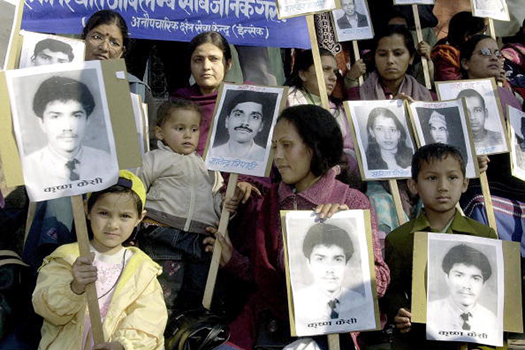
Nov 25, 2019 | News
Nepal has made no real progress on questions of justice, truth and reparations for victims of gross human rights violations and abuses during its 10-year conflict, the ICJ, Amnesty International, Human Rights Watch (HRW) and TRIAL International said today.
The Comprehensive Peace Agreement to end the war was signed on November 21, 2006.
While two commissions have been set up to address conflict-era atrocities, they have not been effective and impunity and denial of access to justice to victims remain prevalent. The four human rights organizations are particularly concerned about the recent moves that suggest that the government will go forward with the appointing of commissioners without making necessary reforms to the legal framework.
“Last week marked the 13th anniversary of the Comprehensive Peace Agreement that ended the conflict in Nepal. It is astonishing that so little progress has been made in responding to the clearly articulated concerns and demands of conflict victims,” said Frederick Rawski, ICJ’s Asia-Pacific Director. “These demands have included a transparent and consultative process for the appointment of commissioners, and a genuine good-faith effort by political leaders and lawmakers to address serious weaknesses in the existing legal framework.”
On November 18, a five-member committee formed by the government to recommend names for commissioners to be appointed to the Truth and Reconciliation Commission and the Commission on the Investigation of Enforced Disappearances published a list of candidates. Concerns have been raised by victims and civil society that the government will simply re-appoint past commissioners or make political appointments that will not be adequately impartial and independent.
“It is deeply disappointing that the government has repeatedly attempted to appoint the commissioners without adequate consultation and transparency . The commissions will not gain the trust of the victims and the international community if the political parties continue to interfere in the appointment process,” said Biraj Patnaik, South Asia Director at Amnesty International.
Importantly, the move suggests that the commissions will be re-constituted without amending the legal framework governing the transitional justice process and ensuring its compliance with Nepal’s international human rights law obligations, as directed by Nepal’s Supreme Court and demanded by civil society and victims.
Victims and civil society organizations have issued public statement making it clear that they oppose any appointments prior to the amendment of the legal framework. Notably, the National Human Rights Commission, in its statement commemorating 13th Anniversary of CPA, stated that “…the commission will not support any decision, work or activities that might hurt the sensitivity of the conflict victims…”.
“The government’s move has not only undermined victims’ role in the transitional justice process, but has also once again brought into question its commitment to uphold its international law obligations and ensuring justice for conflict-era crimes,” said Tomás Ananía, TRIAL International’s Nepal Program Manager.
The ICJ, Amnesty International, Human Rights Watch and TRIAL International have repeatedly expressed concern that effective transitional justice mechanisms require strong legal foundations consistent with international law and good practices, and the political will to address the concerns of victims of the conflict. All four organisations reiterated their calls to amend the the 2014 Transitional Justice Act to make it consistent with the Supreme Court’s rulings and international human rights standards, as well as for the initiation of a genuine consultative and transparent process for the appointment of commissioners.
Concerns raised about the existing, and proposed, legal frameworks include: disparities between the definitions of specific crimes under international law and human rights obligations and violations under national, and international law; inadequate provisions to ensure that serious crimes under international law are subject to criminal accountability (including punishment proportionate to the seriousness of the crimes); and a reliance on compensation at the expense of other forms of reparation and remedy for conflict survivors and their families.
Under the principle of universal jurisdiction states may make it possible for their domestic criminal justice system to investigate and prosecute crimes such as torture, committed by any person, anywhere in the world.
This means that a citizen of any country, including Nepal, suspected of such crimes faces the risk of arrest and prosecution for these crimes in countries that apply universal jurisdiction. This is more likely if the Nepali authorities do not appear able and willing to prosecute those responsible for such crimes, the organizations said.
“After initial pledges to ensure truth, justice, and reparations for conflict victims, it appears that the government is once again determined to protect those responsible for the crimes,” said Meenakshi Ganguly, South Asia director at Human Rights Watch. “The international community should remind Nepal that whitewashing egregious crimes will not help to dodge universal jurisdiction.”
Contact:
Download the complete press-release in English and Nepali. (PDF)
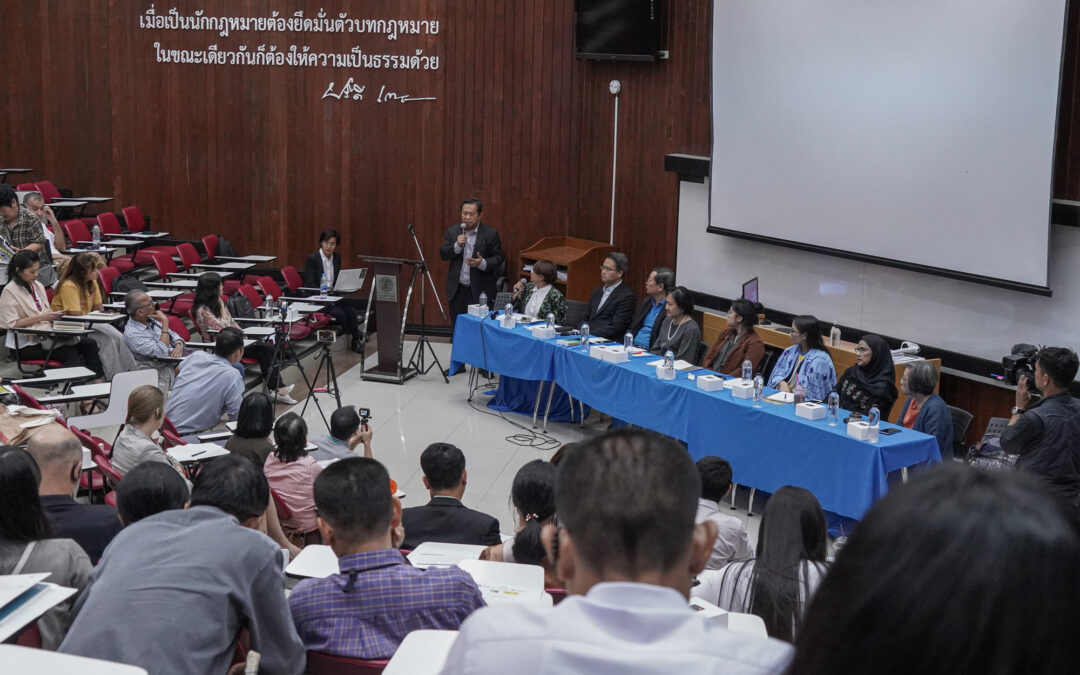
Sep 2, 2019 | News
On 30 August 2019, on the occasion of the International Day of the Disappeared, the ICJ co-hosted an art exhibition, a closed-door round table discussion and a public forum titled “Enforced Disappearance and the Absence of a Law” to commemorate individuals who were subject to apparent enforced disappearance and whose fates remains unknown.
The closed-door round table discussion provided an opportunity for victims’ voices to be heard on challenges faced in gaining access to justice and redress. Relatives spoke about the challenges they face, mostly about the poor progress of investigations into the allegations of enforced disappearance against their relatives.
Sanhawan Srisod, the ICJ’s Legal Adviser, during the closed-door round table discussion, gave a briefing about the latest developments on the Draft Prevention and Suppression of Torture and Enforced Disappearance Act. The legislation had been dropped by the National Legislative Assembly (NLA) prior to the 2019 national elections, but is currently before the President of the National Assembly, pending his consideration to bring it before the House of Representative.
The public forum focused on the development and progress of the investigations into enforced disappearances and evaluated the progress in developing legislation in Thailand to address this critical issue.
During the public forum, Sanhawan Srisod highlighted that the Draft Act would, if adopted, fail to bring the law into full compliance with Thailand’s international human rights obligations. The key concerns include:
- Incomplete definitions of the crimes of enforced disappearance;
- The continuous nature of the crime of enforced disappearance that was not recognized in the Draft Act;
- Inadequacy of provisions on the command responsibility;
- Possibility that the military court may have power to try and adjudicate enforced disappearance cases; and
- Insufficient safeguards against enforced disappearances.
Background
Thailand has signed but has yet to ratify the International Convention for the Protection of All Persons from Enforced Disappearance.
According to their 2018 annual report, the UN Working Group on Enforced or Involuntary Disappearances has recorded 86 outstanding cases of alleged enforced disappearance in Thailand.
The Thai government, through the recently set up Committee Managing Complaints for Torture and Enforced Disappearance Cases, says it is currently conducting investigations in connection with this list.
Closed-door round table discussion session included the following speakers: Ms. Phinnapha Phrueksaphan, wife of Mr. Porlajee Billy Rakchongcharoen; Ms. Angkhana Neelapaijit, wife of Mr. Somchai Neelapaijit; Ms. Pranee Danwattananusorn, wife of Mr. Surachai Danwattananusorn; Mr. Adisorn Pho-Arn, son of Mr. Thanong Pho-Arn; Ms. Kanya Theerawut, mother of Mr. Siam Theerawut; Ms. Suphab Kamlae, wife of Mr. Den Kamlae; Mr. Prasert Laosophapan, brother of Mr. Kamon Laosophapan; Ms. Shui-Meng Ng, wife of Mr. Sombath Somphone from Lao PDR; Mr. Truong Son Nguyen, Regional Campaigner, Amnesty International Vietnam; Representatives, indigenous Lahu Community, Chiang Mai province; and Ms. Sanhawan Srisod, Legal Adviser, International Commission of Jurists
Public forum session included the following speakers: Ms. Shui-Meng Ng, representative of Asian Federation Against Involuntary Disappearances; Ms. Angkhana Neelapaijit, wife of Mr. Somchai Neelapaijit; Ms. Phinnapha Phrueksaphan, wife of Mr. Porlajee Billy Rakchongcharoen; Mr. Angsukate Wisutwattanasak, Director of Security Cases Department 1, Department of Special Investigation (DSI); Ms. Nongporn Roongpetchwong, Human Rights Expert, Rights and Liberties Protection Department, Ministry of Justice; and Ms. Sanhawan Srisod, Legal Adviser, International Commission of Jurists. The opening session included remarks from Mr. Giuseppe Busini, Deputy Head of Mission of the Delegation of the European Union to Thailand, and Mr. Surapong Kongchantuk, President of the Cross-Cultural Foundation. The closing session included remarks from Mr. Badar Farrukh, Human Rights Officer, OHCHR Regional Representative for South East Asia.
See Also:
Summary of the ICJ analysis of the Draft Act (PDF)
Thailand: ICJ submits recommendations on draft law on torture and enforced disappearance amendments
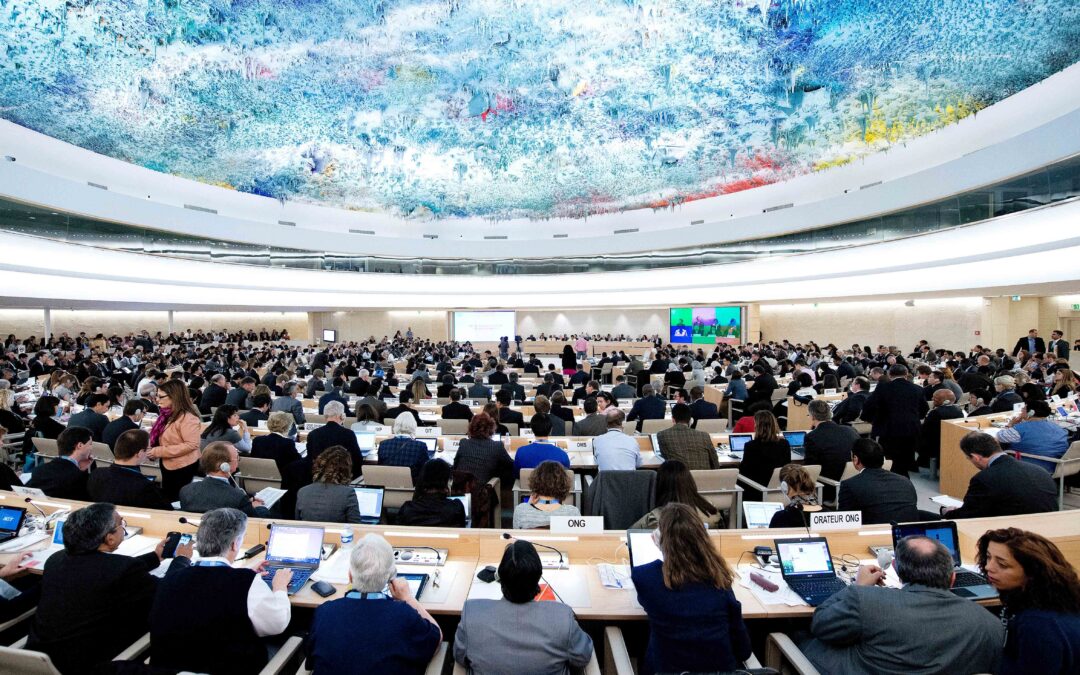
Jul 3, 2019 | Advocacy, Non-legal submissions
The ICJ today joined other NGOs in drawing the attention of the UN Human Rights Council to extra-judicial killings and enforced disappearances in Kashmir.
The statement, delivered by International Federation for Human Rights Leagues (FIDH) on behalf of Asian Forum for Human Rights and Development (FORUM-ASIA), Human Rights Watch, International Commission of Jurists, and World Organisation Against Torture (OMCT), read as follows:
“We look forward to the publication of the High Commissioner for Human Rights’ second-ever report on the grave human rights violations and abuses committed in Kashmir.
In Indian Administered Kashmir, government forces have been responsible for serious violations, including unlawful killings, enforced disappearances, torture, and rape and other sexual violence. These grave violations by security forces in Kashmir are met with chronic impunity, as alleged perpetrators are rarely properly prosecuted for human rights violations, leading to near-total immunity for the crimes committed. Non-state armed groups have also been responsible for serious abuses, including attacks against journalists.
In Pakistani Administered Kashmir, there have been reports of unlawful restrictions on freedom of expression and association, as well as the misuse of anti-terrorism legislation against protesters.
We are gravely concerned by the increasing threats faced by, and reprisals against, human rights defenders and others who have cooperated with UN human rights mechanisms in recent years, particularly in the elaboration of the OHCHR’s reports. We urge the Government of India to ensure that human rights defenders and journalists are allowed to carry out their work without threats or reprisals, and take adequate steps to protect them from non-state groups.
We also remain concerned that the Governments of India and Pakistan continue to deny access to OHCHR and other human rights mechanisms to Kashmir. We call on them to grant unconditional access to these mechanisms, as well as to human rights organizations and the media.
We also call on the Council to act on the call to establish a commission of inquiry.”









